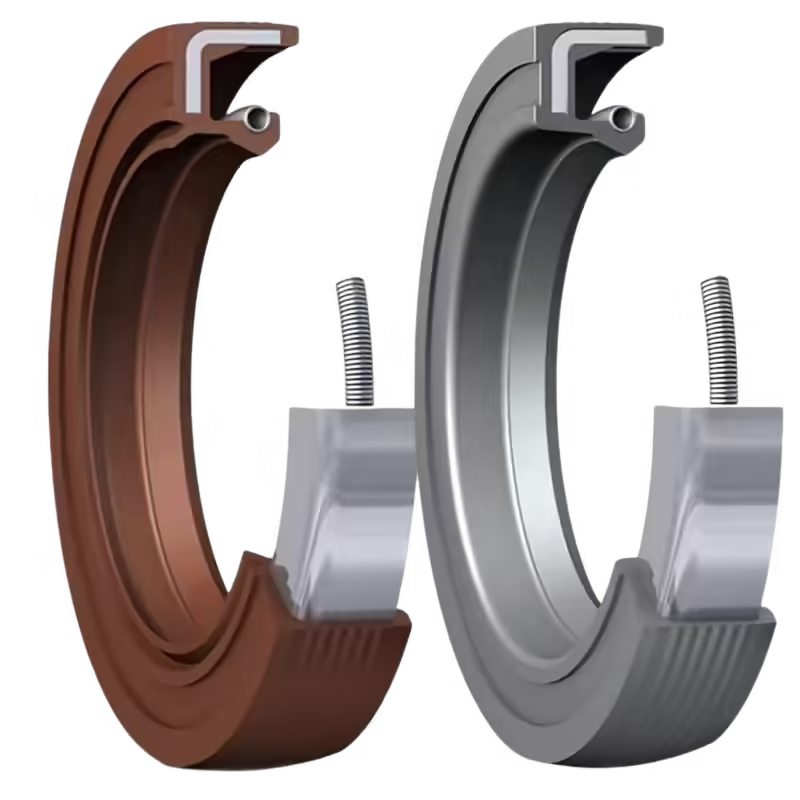The Benefits of Custom Gaskets
In modern industrial systems, gaskets play a crucial role in ensuring tight, reliable seals between two or more surfaces. These seemingly simple components are often the unsung heroes of process integrity, preventing leaks, controlling pressure, and maintaining optimal operating conditions across a wide range of applications. While standard, off-the-shelf gaskets can be suitable for common usage scenarios, many industries are increasingly turning to custom gaskets to address more specialized needs. Custom gaskets, designed and manufactured to exact specifications, can overcome the limitations of standard solutions, providing enhanced performance, greater durability, and a perfect fit even in the most challenging environments.
1. Limitations of Standard Gaskets
Restricted Availability of Standard Sizes
One of the primary drawbacks of relying solely on standard gaskets—such as typical O-rings or widely available oil seals—is the limited range of dimensions and configurations. Flat gaskets, in particular, lack universal sizing standards, making it challenging to find an off-the-shelf product that precisely matches the dimensions required by non-standard equipment. This limited availability often forces engineers to compromise on design, resulting in suboptimal sealing performance and reduced reliability.
Incompatibility with Unique Use Cases
Industrial applications seldom conform to a one-size-fits-all model. Certain environments demand unique properties—be it resistance to extreme temperatures, exposure to corrosive chemicals, or the ability to sustain high pressures. Standard gaskets, produced in bulk with uniform specifications, simply cannot meet all these specialized requirements. As a result, engineers may be forced to accept gaskets that are ill-suited for the task at hand, potentially leading to premature failure, costly downtime, and heightened safety risks.
2. Advantages of Custom Gaskets
Tailored Design and Specifications
Custom gaskets are designed with one goal in mind: delivering an exact fit for a given application. Instead of working around the constraints of a standardized product, engineers can specify precise dimensions, shapes, and thicknesses. This customization ensures that each gasket aligns seamlessly with the components it is intended to seal, optimizing leak prevention and extending the lifespan of the overall system. Additionally, material selection can be fine-tuned—whether the priority is heat resistance, chemical compatibility, or mechanical strength.
Wide Range of Material Options
A hallmark advantage of custom gaskets is the freedom to choose from an extensive selection of materials. From rubber and silicone to EPDM, NBR, and metal composites, a wealth of options is available to ensure optimal performance in a given environment. High-temperature silicone can handle extreme heat, while EPDM excels in resisting weathering and ozone exposure. For systems that must withstand acids, alkalis, or oil, selecting the right elastomer ensures the gasket functions reliably, even under punishing operating conditions.
Enhanced Performance in Specialized Conditions
When standard gaskets are pushed beyond their intended capabilities, they tend to fail prematurely, causing downtime and losses in productivity. Custom gaskets, by contrast, are specifically engineered to perform under the exact conditions they will encounter. Whether it’s operating at ultra-high pressures, functioning within corrosive chemical processing environments, or reliably sealing at cryogenic temperatures, custom gaskets can deliver performance and longevity that standard counterparts cannot match.
Precision Manufacturing Techniques
The manufacturing methods employed in producing custom gaskets—ranging from laser cutting to compression molding—enable exceptional accuracy and consistency. Laser cutting is ideal for quick prototyping and smaller production runs, offering rapid turnaround while maintaining precise dimensions. For high-performance applications that require complex shapes or elevated material properties, compression molding provides a way to create gaskets with superior seal integrity and long-term durability.
3. Advanced Manufacturing Techniques in Custom Gasket Production
Laser Cutting for Rapid Production
Laser cutting technology is highly efficient for creating custom gaskets, especially when time is of the essence. This technique uses rubber sheets that can be quickly cut to exact specifications, making it well-suited for urgent orders or limited production volumes. While primarily recommended for general-purpose gaskets operating under normal conditions, laser cutting is a valuable option for swiftly meeting immediate needs without sacrificing quality.
Compression Molding for Complex Applications
Compression molding is a more specialized method that excels in producing high-performance gaskets for demanding environments. By applying heat and pressure in controlled conditions, compression molding can achieve superior material uniformity and dimensional accuracy. The resulting gaskets offer exceptional durability, sealing performance, and the ability to withstand aggressive chemicals, extreme temperatures, and elevated pressures. This method is ideal for industries where stringent operating conditions leave no margin for error.
4. Key Considerations When Choosing Custom Gaskets
Material Selection Based on Application
No single material can address every operational challenge. Selecting the appropriate elastomer or composite is critical for ensuring that the gasket meets the application’s demands. For example, silicone’s high thermal stability makes it invaluable in high-temperature processes, while NBR (nitrile rubber) is ideal for applications involving oils and fuels. EPDM, meanwhile, is often chosen for outdoor uses due to its excellent weather resistance. Matching the material to the environment is the cornerstone of a reliable gasket solution.
Manufacturer Expertise and Capabilities
When investing in custom gaskets, the choice of manufacturer is just as important as the gasket design itself. Partnering with an experienced, well-equipped manufacturer ensures that the project benefits from advanced manufacturing techniques, expert guidance on material selection, and a proven track record of delivering quality products. Skilled manufacturers can navigate complex requirements, propose cost-effective alternatives, and ensure that the final gaskets consistently meet or exceed industry standards.
Cost and Lead Time
Custom solutions may involve higher upfront costs, but the investment often pays dividends in the long run through improved system performance, reduced downtime, and extended component lifespans. Balancing budget considerations with performance objectives is essential, as is having open communication with the manufacturer to establish realistic lead times. In many cases, the improved reliability and functionality of custom gaskets quickly offset initial expenses and shorter production cycles can help expedite projects or avoid prolonged downtime.
Conclusion
Custom gaskets represent a strategic solution for industries that demand more than off-the-shelf components can provide. By delivering precise fits, offering a wealth of material options, and enabling configurations that can endure harsh, specialized environments, custom gaskets significantly enhance sealing performance and reliability. As manufacturing techniques such as laser cutting and compression molding continue to advance, these tailored solutions become increasingly accessible and cost-effective. Selecting the right manufacturing partner ensures that companies can capitalize on the full spectrum of benefits associated with custom gaskets—ultimately driving higher productivity, safer operations, and more efficient processes.





